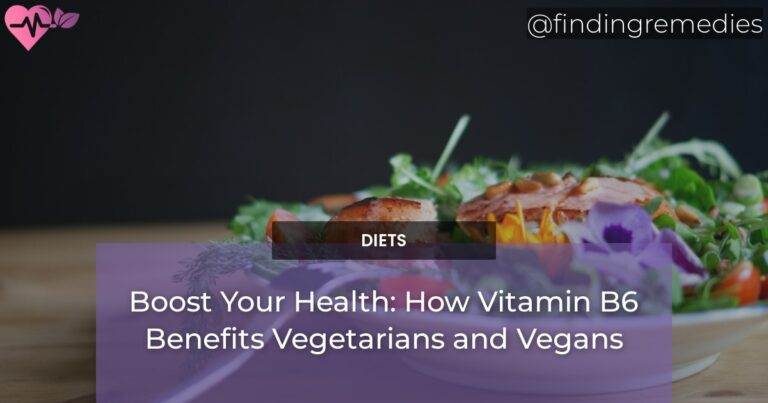Importance of Vitamin B6 for Vegetarians and Vegans
Vitamin B6, also known as pyridoxine, is a water-soluble vitamin that plays a crucial role in the body. It is involved in over 100 enzyme reactions that help with the metabolism of proteins, carbohydrates, and fats. Vitamin B6 also plays a role in the formation of red blood cells, neurotransmitters, and the immune system.
For vegetarians and vegans, it is especially important to ensure adequate intake of Vitamin B6. This is because many of the best sources of Vitamin B6 are found in animal products, such as poultry, fish, and organ meats. Therefore, vegetarians and vegans may be at a higher risk of Vitamin B6 deficiency.
Table of Contents
Daily Recommended Dose of Vitamin B6
The daily recommended dose of Vitamin B6 for adults is between 1.3-1.7 mg per day, depending on age and gender. For pregnant and breastfeeding women, the recommended dose increases to 1.9-2.0 mg per day. For children, the recommended dose ranges from 0.1-1.3 mg per day, depending on age.
Plant-Based Sources of Vitamin B6
Fortunately, there are plenty of plant-based sources of Vitamin B6 available. Some of the best sources include:
- Chickpeas (1 cup cooked) – 1.1 mg
- Fortified cereals (1 cup) – 0.5-2.0 mg
- Potatoes (1 medium) – 0.7 mg
- Bananas (1 medium) – 0.4 mg
- Avocado (1 medium) – 0.4 mg
- Bell peppers (1 cup) – 0.3 mg
- Spinach (1 cup cooked) – 0.4 mg
Cooking Methods and Food Combinations to Preserve Vitamin B6 Content
To ensure that the cooking methods used preserve the Vitamin B6 content in food, it is best to use cooking methods that do not involve high heat or prolonged cooking times. Steaming, baking, and microwaving are all good options. Boiling and frying can cause a significant loss of Vitamin B6.
Combining Vitamin B6-rich foods with other nutrients can also help to increase absorption in the body. Pairing Vitamin B6-rich foods with a source of vitamin C, such as bell peppers or citrus fruits, can help to increase absorption.
Vitamin B6-Rich Vegan and Vegetarian Food Items
In addition to the plant-based sources of Vitamin B6 listed above, there are many other vegan and vegetarian food items that are rich in this essential nutrient. Here are some additional options:
- Sunflower seeds (1/4 cup) – 0.4 mg
- Tahini (2 tbsp) – 0.3 mg
- Soybeans (1/2 cup) – 0.3 mg
- Walnuts (1/4 cup) – 0.2 mg
- Brown rice (1 cup cooked) – 0.2 mg
- Lentils (1 cup cooked) – 0.2 mg
Supplements for Vitamin B6 Intake
Supplements are available for vegetarians and vegans who are not able to get adequate Vitamin B6 from their diet. However, it is important to be cautious when taking supplements, as excessive intake can lead to toxicity.
It is generally safe to take up to 100 mg of Vitamin B6 per day, but doses higher than this can cause neurological symptoms such as numbness and tingling in the hands and feet.
Side Effects of Vitamin B6 Overdose and Deficiency Symptoms
As mentioned above, excessive Vitamin B6 intake can cause neurological symptoms. On the other hand, deficiency of Vitamin B6 can also lead to symptoms such as anemia, skin rashes, and depression.
To ensure that you are not at risk of either overdose or deficiency, it is important to aim for the recommended daily dose of Vitamin B6 and to consume a variety of plant-based sources of this essential nutrient.
Vitamin B6 and its Role in Energy Production
Vitamin B6 plays a crucial role in the metabolism of carbohydrates, which are the body’s primary source of energy. Therefore, ensuring adequate intake of Vitamin B6 is essential for maintaining healthy energy levels.
In conclusion, vegetarians and vegans can easily meet their daily Vitamin B6 requirements by consuming a variety of plant-based sources of this essential nutrient. By choosing the right cooking methods and food combinations, and considering supplements when necessary, vegetarians and vegans can maintain optimal health and wellbeing with sufficient intake of Vitamin B6.

